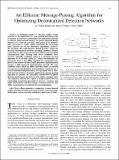| dc.contributor.author | Kreidl, Olivier Patrick | |
| dc.contributor.author | Willsky, Alan S. | |
| dc.date.accessioned | 2012-10-04T16:33:08Z | |
| dc.date.available | 2012-10-04T16:33:08Z | |
| dc.date.issued | 2010-02 | |
| dc.date.submitted | 2008-09 | |
| dc.identifier.issn | 0018-9286 | |
| dc.identifier.issn | 1558-2523 | |
| dc.identifier.uri | http://hdl.handle.net/1721.1/73604 | |
| dc.description.abstract | A promising feature of emerging wireless sensor networks is the opportunity for each spatially-distributed node to measure its local state and transmit only information relevant to effective global decision-making. An equally important design objective, as a result of each node's finite power, is for measurement processing to satisfy explicit constraints on, or perhaps make selective use of, the distributed algorithmic resources. We formulate this multi-objective design problem within the Bayesian decentralized detection paradigm, modeling resource constraints by a directed acyclic network with low-rate, unreliable communication links. Existing team theory establishes when necessary optimality conditions reduce to a convergent iterative algorithm to be executed offline (i.e., before measurements are processed). Even so, this offline algorithm has exponential complexity in the number of nodes, and its distributed implementation assumes a fully-connected communication network. We state conditions under which the offline algorithm admits an efficient message-passing interpretation, featuring linear complexity and a natural distributed implementation. We experiment with a simulated network of binary detectors, applying the message-passing algorithm to optimize the achievable tradeoff between global detection performance and network-wide online communication. The empirical analysis also exposes a design tradeoff between constraining in-network processing to preserve resources (per online measurement) and then having to consume resources (per offline reorganization) to maintain detection performance. | en_US |
| dc.description.sponsorship | United States. Army Research Office. Multidisciplinary University Research Initiative (Grant W911NF-05-1-0207) | en_US |
| dc.description.sponsorship | United States. Army Research Office. Multidisciplinary University Research Initiative (Grant W911NF-06-1-0076) | en_US |
| dc.language.iso | en_US | |
| dc.publisher | Institute of Electrical and Electronics Engineers (IEEE) | en_US |
| dc.relation.isversionof | http://dx.doi.org/10.1109/tac.2009.2039547 | en_US |
| dc.rights | Article is made available in accordance with the publisher's policy and may be subject to US copyright law. Please refer to the publisher's site for terms of use. | en_US |
| dc.source | IEEE | en_US |
| dc.title | An Efficient Message-Passing Algorithm for Optimizing Decentralized Detection Networks | en_US |
| dc.type | Article | en_US |
| dc.identifier.citation | Kreidl, O.P., and A.S. Willsky. “An Efficient Message-Passing Algorithm for Optimizing Decentralized Detection Networks.” IEEE Transactions on Automatic Control 55.3 (2010): 563–578. © Copyright 2010 IEEE | en_US |
| dc.contributor.department | Massachusetts Institute of Technology. Department of Electrical Engineering and Computer Science | en_US |
| dc.contributor.mitauthor | Kreidl, Olivier Patrick | |
| dc.contributor.mitauthor | Willsky, Alan S. | |
| dc.relation.journal | IEEE Transactions on Automatic Control | en_US |
| dc.eprint.version | Final published version | en_US |
| dc.type.uri | http://purl.org/eprint/type/JournalArticle | en_US |
| eprint.status | http://purl.org/eprint/status/PeerReviewed | en_US |
| dspace.orderedauthors | Kreidl, O.P.; Willsky, A.S. | en |
| dc.identifier.orcid | https://orcid.org/0000-0003-0149-5888 | |
| mit.license | PUBLISHER_POLICY | en_US |
| mit.metadata.status | Complete | |
